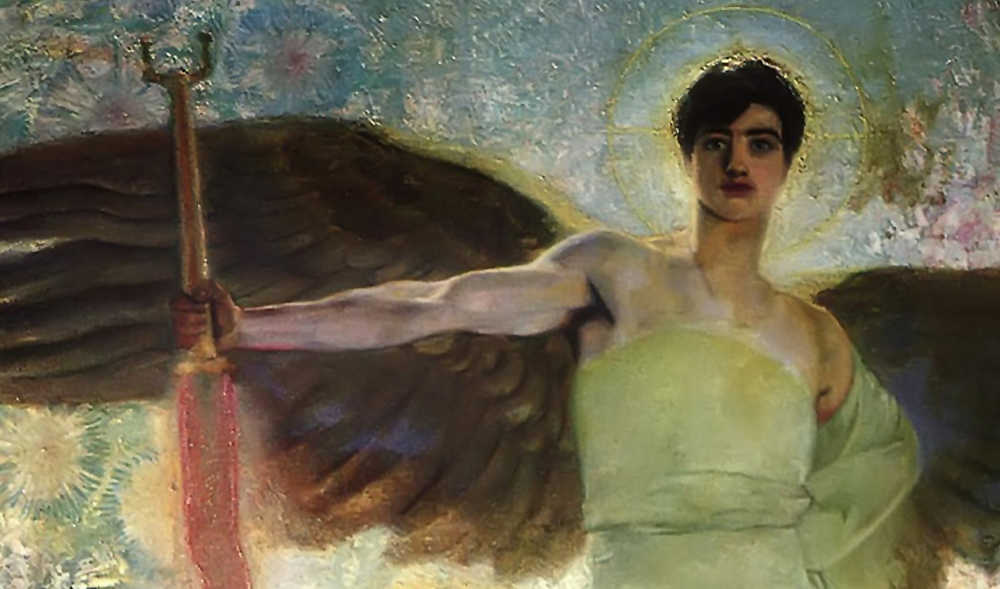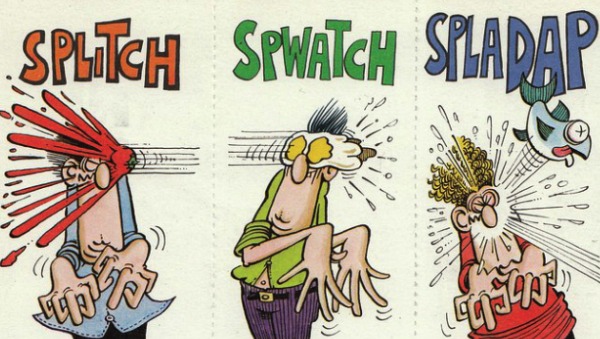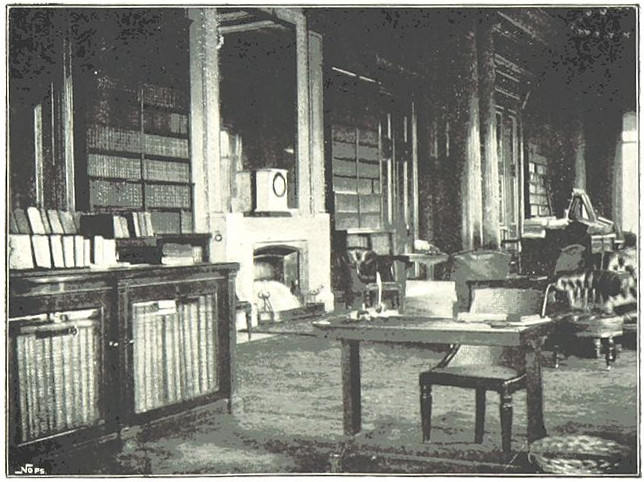
A famous artist once painted an angel with six toes.
‘Who ever saw an angel with six toes?’ people inquired.
‘Who ever saw one with less?’ was the counter-question.
— Life, June 12, 1890

A famous artist once painted an angel with six toes.
‘Who ever saw an angel with six toes?’ people inquired.
‘Who ever saw one with less?’ was the counter-question.
— Life, June 12, 1890

Don Martin’s cartoons in MAD magazine were famous for their sound effects:

Dear God,
I wrote you before do you remember? Well I did what I promised. But you did not send me the horse yet. What about it?
Lewis
— Children’s Letters to God, 1967

Church signs, collected by Steve and Pam Paulson for Church Signs Across America, 2006:
BE AS GOOD A PERSON AS YOUR PET BELIEVES YOU ARE
THE EASTER BUNNY DIDN’T RISE FROM THE DEAD
BE YOURSELF, EVERYONE ELSE IS TAKEN
DON’T GIVE UP! MOSES WAS ONCE A BASKET CASE
CH CH: WHAT’S MISSING? U R
LIFE IS CHANGE, GROWTH IS OPTIONAL
ETERNITY: SMOKING OR NONSMOKING
GIVE YOUR TROUBLES TO GOD HE’S UP ALL NIGHT ANYWAY
WORRY IS THE DARK ROOM WHERE NEGATIVES DEVELOP
LOOKING FOR A LIFEGUARD? OURS WALKS ON WATER
FIRE PROTECTION POLICY AVAILABLE INSIDE
DON’T WAIT FOR SIX STRONG MEN TO TAKE YOU TO CHURCH!
PRAY UNTIL SOMETHING HAPPENS
WHEN THE LAST TRUMPET SOUNDS WE’RE OUTTA HERE
Also, from Christianity Today: GOD HAS NO FAVORITES BUT THE SIGN GUY DOES GO BLACKHAWKS

At London’s prestigious Atheneum a venerable retainer reported to the club manager that member Prestwick was asleep in his favorite wing chair with a copy of The Times folded across his face. ‘What’s so unusual about that?’ asked the manager. ‘Member Prestwick has always slept in that chair with The Times folded across his face.’
‘I know, sir,’ replied the retainer, ‘but it’s yesterday’s Times.’
— Louis Kronenberger, The Cutting Edge, 1970
How to escape the police while carrying a coil of duct tubing.

In 1936 English humorist A.P. Herbert found himself sitting in Parliament as an independent member for Oxford University. He drafted the following bill in verse to honor the new season — it’s a shame that it wasn’t enacted:
Whereas in every lawn and bed the plucky crocus lifts his head, and to and fro sweet song-birds go, the names of which we do not know:
Whereas the woods no more are dumb, the Boat Race and the Budget come, the Briton swells his manly chest, his mate, as eager, scrubs the nest, and Spring, with light but lavish hand, is spreading madness o’er the land:
It is expedient — but in rhyme — to legislate for such a time: Be it enacted, therefore, by our King with Lords and Commons in a fairy ring, assembled joyously at Westminister (or any other place that they prefer):
Provision for a Season Called Spring
1. (i) It shall be lawful everywhere for citizens to walk on air, to hang their hats upon the trees and wander hatless if they please: and notwithstanding any cracked provision in a previous Act, to give a constable a kiss is not felonious after this.
(ii) All citizens who choose to ride on taxi-tops and not inside: and those who do not use their votes because they’re busy painting boats: and any miscreant who hums, instead of doing dismal sums: whoever does a silly thing need only answer “‘Tis the Spring”: and this shall be a good defence in any court with any sense:
Provided that, in late July, this Act, of course, does not apply.
Financial Provisions
2. If any person feels he must get out of London now or bust, because the Spring is in his bones, but he must work for Mr. Jones, it shall be lawful for the same to give the Treasury his name, and say “Upon sufficient grounds I want about a hundred pounds”: and there shall not be any fuss concerning sums expended thus.
Repeal of Redundant Statutes
3. Subsection (i) of Section Four of any Act that seems a bore, and all the Acts concerning beer, and every Act that is not clear (always excepting Schedule A), shall be repealed and thrown away.
House of Commons — Reform of Procedure — Music etc.
4. (i) There shall be banks of maidenhair arranged about the Speaker’s chair: and roses white and roses red shall hang above the Speaker’s head: like some tremendous window-box, the Galleries be gay with phlox: and goldfish, lovely but aloof, shall swim above the glassy roof.
(ii) From now until the First of June all speeches shall be sung (in tune). The Speaker shall determine what hon. Members are in tune or not.
(iii) When in Committee of Supply the House may hum (but not too high). The Clerk-Assistant-at-the-Table shall choose the key (if he is able).
(iv) A band shall nearly always play (not on the first Allotted Day) behind the Speaker’s Chair at three and on the Terrace after tea.
Saving for Committees
5. On any day in May or June Committees shall adjourn quite soon: Provided, if the cuckoo call, Committees shall not sit at all.
Sittings of the Upper House
6. The House of Lords shall never sit on sunny days till after Whit: and they shall rise, if they have met, when it is foggy, fine or wet.
Termination of Official Report
7. (i) Except as hereinafter hinted, Hansard shall not again be printed, and save as in this Act is learned, all previous Hansards shall be burned.
(ii) It is a pity, history teaches, to make reports of people’s speeches, and afterwards to be unkind, simply because they change their mind. It is a most disgusting thing to make such comments in the Spring: so, as from when this Act is passed, that day’s Report shall be the last.
(iii) And as regards exceptions, see Subheading (a) of Schedule B.
Powers and Duties of Departments
8. (i) The secretary of State for Home Affairs shall now proceed to Rome, to Moscow, Washington, Cathay, or anywhere that’s far away, and not return to English skies until the Speaker certifies that Spring has ceased to be a fact under the Moss (Collection) Act.
(ii) Meanwhile o’er all his grim domain a lovely golden girl shall reign: and this delicious creature shall give golden parties in the Mall (paying the bills, if she is dunned, from the Consolidated Fund). The Civil Service, hand in hand, shall dance in masses down the Strand: and all the Cabinet shall wear wild dandelions in their hair.
(iii) It shall be deemed that every one has come into the world for fun. This shall be printed on the wall of every office in Whitehall.
Penalties for Certain Expressions
9. (i) No kind of crisis shall excuse a man exploring avenues: no lesser doom does he deserve when he is straining every nerve: and special punishment is earned by those who leave no stone unturned.
(ii) The penalty for each offence shall be elastic but immense.
(iii) A pension shall reward the man who modestly does all he can.
Interpretation
10. (i) The greatest care has been employed to make this measure null and void: not one expression in this Act means anything it means in fact.
(ii) Examples we decline to give: the lawyers, after all, must live.
Application
11. This Act applies and shall be good where anybody thinks it should:
Provided that, if strong objection should be expressed to any Section, that Section shall not have effect except for those who don’t object.
SCHEDULE B (a)
Any speech, motion, question, amendment or interruption by
A.P.H.
Recreations listed in Who’s Who by eccentric Scottish MP Sir Nicholas Fairbairn:
1975: Creative
1976: Creating
1977: Bunking and debunking
1979: Upholding what’s right and demolishing what’s left
1980: Giving and forgiving
1981: The cure and eradication of British tick fever
1983: Being blunt and sharp at the same time
1984: Philanthropy and philogyny
1986: Ornitholatry
1987: Serving queens, restoring castles, debunking bishops, entertaining knights, befriending pawns
1988: Snookering the reds and all other proctalgias
1989: Draining brains and scanning bodies
1990: Growling, prowling, scowling and owling
1991: Loving beauty and beautifying love
1993: Drawing ships, making quips, confounding Whigs and scuttling drips
1995: Languishing and sandwiching
In 1973 he listed his recreations as “Making love, ends meet and people laugh.” He said, “I think most people, if they were honest, will admit that those were their main recreations — apart, perhaps, from Ted Heath, who would probably miss out on the first and third.”
(from Neil Hamilton, Great Political Eccentrics, 1999.)

One day a young man was walking down a road when a frog called to him: “Boy, if you kiss me, I will turn into a beautiful princess.”
The young man picked up the frog, smiled at it and put it in his pocket.
A short while later, the frog said, “Boy, if you kiss me and turn me back into a beautiful princess, I’ll be yours.”
The young man took the frog from his pocket, smiled at it and put it back.
Now the frog was upset. “Boy, what is the matter?” the frog cried. “I have told you that I am a beautiful princess, and if you kiss me, I’ll be yours!”
The young man took the from from his pocket, looked at it and said: “Look, I’m an engineer. I have no time for a girlfriend, but a talking frog is cool!”
(Anonymous, quoted in C.C. Gaither, Practically Speaking: A Dictionary of Quotations on Engineering, Technology and Architecture, 1999.)

Leo Rosten once received this note from Groucho Marx:
Dear Junior: Please excuse me for not answering your letter sooner. But I have been so busy not answering letters lately that I have not been able to get around to not answering yours in time. Love, Groucho.